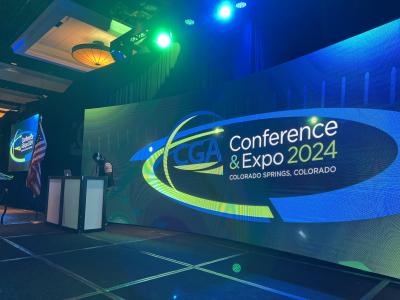Stephen Hitch, a manager in Caterpillar’s Dealer Manpower Development department, responsible for Caterpillar’s ThinkBIG program, is passionate about developing and training the best Cat dealer service technicians to be found, around the globe.
“We have 17 ThinkBIG colleges globally,” said Hitch. They are positioned in the “United States, Canada, England, Ecuador, Chile, Peru, and China. Our next ThinkBIG college to open is located in Mexico. Future [2009 to 2010] expansion of ThinkBIG includes South Africa, Saudi Arabia, United Arab Emirates and possibly India.”
Owens Community College in Toledo, Ohio, is one partner in Cat’s ThinkBIG program. Owens takes responsibility for providing Cat with the “cream of the crop” according to Tracy Campbell, chair — transportation technologies.
“Owens trains dealership service technicians for Ohio CAT, MacAllister CAT in Indiana and Michigan CAT.”
Each year up to 34 graduating high school students are selected from a potential applicant pool of approximately 200 at some partner colleges. After a presentation to applicants and their parents, the applicant must interview for the position, provide a resume and three references, and write an essay on how this career will help them.
That’s when the Cat dealership steps in to review the application packages and high school transcripts. A 3.0 grade point average is required during the ThinkBIG college experience, so there is an emphasis in English and math.
Owens then administers a placement test and an evaluation of the mechanical and academic side — and whether or not the student is prepared for an intensive two year program. Each student accepted for the program also completes a four-week internship at a Cat dealership prior to the beginning of the school year, where they talk to other students, a mentor, employees of the dealership, and former students who are now enjoying full employment status as dealer service technicians.
Students spend eight weeks in classroom training and then immediately perform paid internships at a dealership for eight weeks, reinforcing through real-life experience what they’ve learned in the classroom. “We always have students in the classroom and students at the dealership, on a rotating basis,” said Campbell.
“Training is intensive,” Campbell said. “In a typical 16-week semester, students are tested every other week. Under the eight-week system, they get tested every week.”
Job placement upon completion is 100 percent.
Stephen Hitch has been with Cat for 33 years. For 23 of those years he worked on the dealership side of the business. The last 10 years, he has handled manpower issues for Caterpillar Corporation.
“Our Cat dealerships are hospitals for sick and injured equipment,” Hitch said. “Doctors and nurses intern at hospitals. We’ve been using that philosophy of how people learn in internship programs, and improve on it.”
“We wrote our own curriculum, we have a recipe for education, and an eight-element dashboard to assess all colleges. We measure the performance of each student in each college. We expect the same performance in every college no matter which country it’s in.”
“A bulldozer owner in China has the same expectations as a bulldozer owner in Chile. Speed and accuracy count in our world,” Hitch said.
Cat’s curriculum is a captive program where the dealership has the final decision about who is accepted into the program. The program is intellectual property owned by Cat, but it is the partner college that provides qualified candidates for the program. Besides the dealer service technician status, each graduate also earns an Associate degree in Applied Science.
When asked for a prediction of the number of dealer service technicians needed in the United States and in other parts of the world, Hitch said, “Each country and continent has unique challenges. Global expansion is determined by population density, economy, mining opportunities, marine opportunities, and petroleum opportunities. Difficult to predict exactly, but we believe our ’industry’ will require about 80,000 to 100,000 [globally] new technicians by 2020 to meet anticipated market growth.”
Randy Rubley began teaching at Owens in 1984 and began working with Cat dealers in 1996. He has been teaching this program since 2001. He’s taught all of the core classes including Fundamentals in Engines, Electrical, Diesel Fuel Systems, Transmissions and Torque Converters, Differentials and Final Drives, Machine Electronics, Engine Performance, Machine Diagnostics and Machine-Specific Systems.
Rubley has taught many outstanding students and understands that success is defined differently by different individuals. Two students stand out in his memory for very different reasons.
Rubley recalls a young man from his very first class in 1996, Matt Mole, who was not only a very good student, but excelled in this program. Mole began the program right after graduating from high school. He became a dealer service technician and then changed career paths to join the management ranks. Today, Mole is a Black Belt in 6 Sigma, and still with Cat.
According to its Web site, “Cat was the first company to globally launch 6 Sigma and deliver benefits that surpassed implementation costs in the very first year. 6 Sigma was a key enabler to achieving $41.52 billion in sales and revenues in 2006, and it continues to transform the way Caterpillar does business.
“The secret behind 6 Sigma’s success is the people who use it. It engages employees like never before — changing the way they work and fostering teamwork.”
Another student Rubley remembers, a 19-year-old, was accepted at the Kalamazoo, Mich., dealership. Within three weeks of acceptance, he was notified that the dealership was closing. Undaunted, when asked if he would relocate to remain in the program, he rode with his recruiter to meet others in Lansing, Mich.
“Without missing a beat,” said Rubley, he was placed with the Grand Rapids, Mich., dealership, “packed up his stuff, and went on to be an outstanding student.”
Within five years, the young man excelled into a field service manager position.
“He was sent out on his own where he is responsible for making all the decisions,” Rubley said. “He didn’t cave. The field service technician is the highest paid and enjoys the greatest level of confidence Cat [technicians] can have. They are issued the most expensive trucks because they are that well trusted.”
Hitch has his own story to tell. A young woman came out of college in Santiago, Chile, with a mechanical engineering degree. After a couple of years, she decided she wasn’t happy dragging her computer around in an office all day. She was accepted into the Dealer Service Technician Program, and after completing the two-year program, is employed by the largest Cat dealership in the world.
“This is a program for accelerated learners,” Hitch said. “The possibilities for advancement span all levels of Cat’s organization.”
Hitch added that he would like to increase the number of female graduates.
“The percentage of female graduates is not high enough. I’d like to see more gender diversity.”
While the training program is taught in both Spanish and English, Cat will translate into eight major languages. Hitch finds that the dealership executives and managers he deals with around the globe have typically received advanced degrees in the United States. There doesn’t seem to be a language barrier. In Ecuador and in China, the program is taught in English. Textbooks are in English. Many students are bilingual, even though English is their second language.
“Our two-year graduates come out making more than some recent four-year university graduates,” said Hitch. Five years later incomes are very comparable. The difference is that the Cat graduate has the opportunity to graduate with little or no debt because of the paid internships.
Owens Community College’s Rubley said that within three to four years after graduation, “most are making above $50,000 per year. A field service technician will typically be making $90,000 to $110,000 per year.”
Dealer service technicians also may move into parts and parts management, service management or sales and sales management.
“There is a wide variety within each group,” Rubley said.
There is a shortage of dealership-trained technicians “literally everywhere” according to Hitch.
“The problem is especially serious in the United States considering the declining birth rates; too many jobs, not enough people; coupled by high school drop out rates,” which equates to an “unprepared workforce” that is “unprepared for job training.”
Hitch’s formula for success in choosing colleges: “We prioritize by market requirements [growth opportunity at risk] and dealership “pull” to invest in training solutions. Investments are $2 million to $3 million per college. This investment is shared by local Cat dealers, college and Caterpillar: joint ’win-win-win’ attitude.”
There also is a four-year program called ThinkBIGGER for those wishing to achieve a four-year BAS degree and to move directly into management.
“Caterpillar is a global enterprise,” said Hitch.
As such, Caterpillar has donated machines for use by the television show Extreme Makeover, to help out after Hurricane Rita, and to deliver polio vaccines to children in remote regions of India.
When asked what his favorite part of the job is, Hitch replied, “The best part is changing lives, changing homes/family situations, changing communities. My favorite of ALL situations is in Ecuador. There our college serves remote families in the Andes mountains, the Amazon, and four to five students from Venezuela each year. Developing countries are the most enjoyable and rewarding to serve.”
For more information on Caterpillar ThinkBIG, visit www.cat.com or Owens Community College at https://www.owens.edu CEG
Today's top stories















